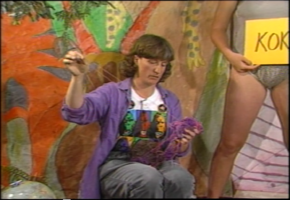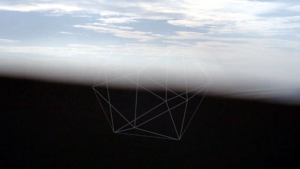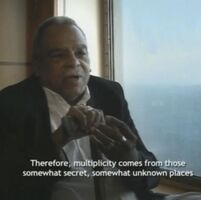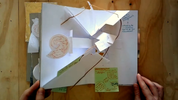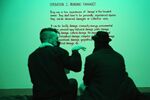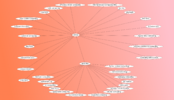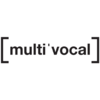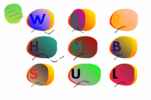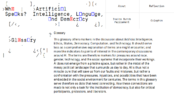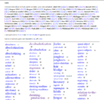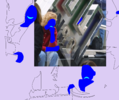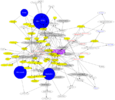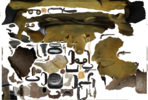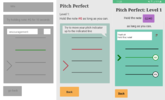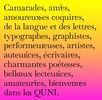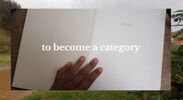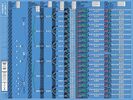Category:Implicancies: Difference between revisions
(Created page with "<div class="toclimit-2"> __TOC__ </div> == Radio Implicancies == '''''If technological systems are implicated in the structuring of knowledge and knowledge systems are implic...") |
(→...) |
||
| (403 intermediate revisions by 26 users not shown) | |||
| Line 1: | Line 1: | ||
<div class="toclimit- | <div class="toclimit-4"> | ||
__TOC__ | __TOC__ | ||
</div> | </div> | ||
== Radio Implicancies = | = <span style="text-shadow: 0 0 30px fuchsia;>Radio Implicancies</span> = | ||
'''Radio Implicancies''' is about practicing interdependencies. About how to stay with the complex entanglements between the personal, the economical, the political and the computational. About thinking, using and making technology with mutual relations in mind. | |||
<gallery widths=300px heights=200px> | |||
File:Yarn.png|thumb|none|300px|[https://papertiger.org/donna-haraway-reads-the-national-geographic-on-primates Donna Haraway Reads “The National Geographic” on Primates], Paper Tiger TV, 1987 | |||
File:Implicancies.png|thumb|300px|none|''4 waters: deep implicancy'' (filmstill), Denise Ferreira Da Silva + Arjuna Neuman, 2019 | |||
File:Tumblr_fd8926e676b0c0077b14705b67213562_e95978bb_1280.jpg|none|thumb|300px|Edouard Glissant, One world in relation. Manthia Diawara, 2009 | |||
</gallery> | |||
'''Radio Implicancies''' | If everything is mixed up with everything else, where do you start? Does it ever end? What does it mean to mean to say “stop” or “cut”? And how could anything change? '''Radio Implicancies''' invites you to experiment with practical and theoretical propositions by feminist, non-binary, queer, anti-colonial and other disobedient researchers/practitioners who each in their own way tug at the threads of techno-ecologies.<ref name="ftn1">"Seems to me that the cultural critic is faced by a world that is very much like tangled balls of yarn. And that one way to approach the situation is to pull on a thread and begin to untangle the ball of meanings. And begin to trace through one thread, and then another, what gets to count as nature, for whom, and when. And how much it costs to produce nature at a particular moment in history, for a particular group of people." Paper Tiger TV, ''Donna Haraway Reads “The National Geographic” on Primates'', 1987 [https://papertiger.org/donna-haraway-reads-the-national-geographic-on-primates/ https://papertiger.org/donna-haraway-reads-the-national-geographic-on-primates/]</ref> They crack jokes and demand the impossible but also pay attention to feelings of discomfort and despair. From and with them we learn about things like refusal, diffraction and figuration and about the openings these might make for imagining technology otherwise. | ||
I borrowed the term “implicancies” from Denise Ferreira Da Silva and Arjuna Neumann. Their film ''4 Waters: Deep Implicancy'' is a poethical exploration of rivers, histories, volcanoes and schools of thought that flow together.<ref name="ftn2">Denise Ferreira Da Silva, Arjuna Neumann (2018), ''4 Waters: Deep Implicancy'' https://vimeo.com/287255021</ref> The “Deep implicancies” in the title of their film signals the entangled responsibilities for maintaining colonial hierarchies between what and who is considered to be of value or not. The film argues that to change this, we first of all need to displace the logics that make extraction, disposession, and segregation work. In an e-mail conversation with Neumann, Da Silva explains that she therefore prefers the term “deep implicancies” over “entanglement” because to her, entanglement is still informed by the possibility of separation, of de-tanglement or a return to a moment before the knot was made.<ref name="ftn3">“Deep Implicancy is an attempt to move away from how separation informs the notion of entanglement.” Denise Ferreira Da Silva in conversation with Arjuna Neumann</ref> This is the challenge we face: how to deal with deep implications and being implicated without falling into the trap of undoing and restoring; of falling for the promise of ''fair algorithms'', ''good data'' and ''zero carbon technologies''. | |||
The Special Issue '''Radio Implicancies''' is an occasion to figure out routines for starting with small things, while keeping bigger structures in mind.<ref name="ftn4">“Any ‘archipelaic’ thought is a trembling thinking, it is about not-presuming, but also about opening and sharing. We do not need to define a Federations of States first, or to install administrative and institutional orders. It already begins its work of entanglement everywhere, without being concerned with establishing preconditions. As far as our relations in the Archipelago are concerned, let us start with the small things, while keeping in mind the big ones.” Edouard Glissant, ''Traite du tout monde'' </ref> Together we’ll test ways to hold complexity, by releasing often and early.<ref name="ftn0">“This well-known watchword among free software developers invites authors to forget about their complexes and to refrain from trying to produce a finished project on their first attempt. The question pertains to what ‘releasing sources’ means. Does this mean publishing source files? Adding comments to the code? Documenting them? Making the code generic in order to make it more easily reusable? This is the reason why it is preferable to publish as early as possible in order to enable others to contribute to the project, code-wise or documentation-wise…” Open Source Publishing (OSP), ''Relearn'', [http://osp.kitchen/api/osp.writing.relearn/5e0cdc51d618e150a67af0f18c21823afa17fa28/blob-data/EN_17-04-18-book.pdf http://osp.kitchen/api/osp.writing.relearn/5e0cdc51d618e150a67af0f18c21823afa17fa28/blob-data/EN_17-04-18-book.pdf]</ref> We’ll experiment with (and think with) ... other computing, alternative orders, queer analytics, affective infrastructures, multiple voices, iterative listening, performative recordings, collaborative annotation, rehearsing improvisation. Let's take a deep breath and ... start from the middle! | |||
<gallery widths=200px heights=100px> | |||
File:Edges.png|[https://youtu.be/zkz0MULEdhE Ajayeb’s edges, pop up book], Sina Seifee | |||
File:QD.jpg|[https://queeringdamage.hangar.org/ Queering Damage] * | |||
File:Otherterms.png|[https://computingwithinlimits.org/2021/papers/limits21-devalk.pdf A pluriverse of local worlds], Marloes de Valk | |||
File:Monstrosities.png|[https://w-i-t-m.net/2020/radio-active-monstrosities.html Radio-active Monstrosities], Angeliki Diakrousi | |||
File:Amazonuser.png|[https://www.janavirgin.com/AMZ The Hidden Life of an Amazon User], Joanna Moll | |||
File:Multivocal.png|[https://multivocal.org/ multivocal]: "explores representation, identity and aesthetics of synthesized voices" | |||
File:Melt.png|[http://meltionary.com/meltries/r.html Bug Report: Tuning to trans*feminist Xystem.Crash], Meltionary | |||
File:Whospeaks.png|[https://whospeaks.eu/ Who Speaks?] Artificial Intelligence, Language, and Democracy | |||
File:Monoskop reader.png|[https://monoskop.org/reader Monoskop Reader] cross-indexes multiple volumes of text with the help of tf–idf | |||
File:Thisemail.png|[https://varia.zone/en/we-hope-this-email.html We Hope This E-mail Finds You Well], Cristina Cochior, Artemis Gryllaki, Christina Karagianni, Amy Pickles | |||
File:Neon.png|[https://titipi.org/pub/Counter_Cloud_Action_Plan.pdf Counter Cloud Action Plan], TITiPI for NEoN * | |||
File:Catalogue.png|[https://diversions.constantvzw.org/wiki/index.php?title=Projects:Zoumana_Me%C3%AFte:_Een_nieuwe_vuurceremonie A new browser ceremony], Martino Morandi and Zoumana Meite | |||
File:Spectra.png|[https://github.com/project-spectra Project Spectra]: vocal-gender training software for trans & gender non-conforming people | |||
File:Baskervol.jpg|[https://typotheque.genderfluid.space/ Inclusive typography @ Typotheque + QUNI], Bye Bye Binary | |||
File:Schaerbeeksetaal.png|[https://www.lalangueschaerbeekoise.be/ Schaerbeekse taal]: Brussels' vocabulary, Constant | |||
File:Herface.jpg|[https://vimeo.com/645996661 How does it matter to see her face], Elodie Mugrefya | |||
File:Conflicted.jpg|[http://lawrenceabuhamdan.com/conflicted-phonemes Conflicted Phonemes], Lawrence Abu Hamdan | |||
</gallery> | |||
== How does this work == | == How does this work == | ||
'''Radio Implicancies''' starts on Tuesday April 12 and from that moment on, we will publish a soundfile every week. This edition of '''Radio Implicancies '''is actually not a live broadcast but a series of eight audio-zines. In a way, Issue #18 is launched every week. | |||
To make a collective environment for sound-production and listening together, we will start building a studio in the first week of the project. For hosting and contextualize the audio-zines, we will also need a basic web-platform. The soundfiles themselves can be created by any means necessary, i.e. you are invited to experiment with different protocols and editorial approaches: readings, DJ-ing, artificial voices, hardware experiments, field recordings … they can be live-on-tape (recorded from live sessions on Tuesday or earlier) or produced otherwise. | |||
Every Tuesday morning, we will take time to listen to the soundfile-in-the-making in the studio. Testing out processes for working together is crucial, so we will keep rotating care-taking roles (coordinating the recording, technical support, preparing materials for publication etc.). | |||
In addition to input by Femke and guests, Manetta, Michael, Joseph and Steve also provide input, feedback and support for your ongoing technical and conceptual work. In the second half of the project, guests will join to propose an exercise, a question, something to read or a discussion. Throughout regular tutorials and group sessions we will build a shared repository of playlists, routines, keywords, references, formats and resources. | |||
'''[https://pad.xpub.nl/p/index_#18 Issue #18 Pad Index]''' | |||
== Schedule == | |||
=== Z E R O === | |||
==== [[Calendars:Networked_Media_Calendar/Networked_Media_Calendar/12-04-2022 -Event 2|<span style="text-shadow: 0 0 20px fuchsia;>Tuesday 12 April</span>]] ==== | |||
https://pad.xpub.nl/p/SI18_zero | |||
https://pad.xpub.nl/p/SI18_vocabulary | |||
{{Calendars:Networked_Media_Calendar/Networked_Media_Calendar/12-04-2022 -Event 2}} | |||
== | ==== [[Calendars:Networked_Media_Calendar/Networked_Media_Calendar/13-04-2022_-Event_1|<span style="text-shadow: 0 0 20px fuchsia;>Wednesday 13 April</span>]] ==== | ||
{{Calendars:Networked_Media_Calendar/Networked_Media_Calendar/13-04-2022_-Event_1}} | |||
=== O N E === | |||
https://pad.xpub.nl/p/SI18_one | |||
==== [[Calendars:Networked_Media_Calendar/Networked_Media_Calendar/19-04-2022 -Event 4|<span style="text-shadow: 0 0 20px fuchsia;>Tuesday 19 April</span>]] ==== | |||
{{Calendars:Networked_Media_Calendar/Networked_Media_Calendar/19-04-2022 -Event 4}} | |||
==== [[Calendars:Networked_Media_Calendar/Networked_Media_Calendar/20-04-2022 -Event 4|<span style="text-shadow: 0 0 20px fuchsia;>Wednesday 20 April</span>]] ==== | |||
{{Calendars:Networked_Media_Calendar/Networked_Media_Calendar/20-04-2022 -Event 4}} | |||
=== T W O === | |||
==== [[Calendars:Networked_Media_Calendar/Networked_Media_Calendar/25-04-2022_-Event_1|<span style="text-shadow: 0 0 20px fuchsia;>Monday 25 April</span>]] ==== | |||
https://pad.xpub.nl/p/SI18_two | |||
{{Calendars:Networked_Media_Calendar/Networked_Media_Calendar/25-04-2022_-Event_1}} | |||
=== < | ==== [[Calendars:Networked_Media_Calendar/Networked_Media_Calendar/26-04-2022 -Event 4|<span style="text-shadow: 0 0 20px fuchsia;>Tuesday 26 April</span>]] ==== | ||
{{Calendars:Networked_Media_Calendar/Networked_Media_Calendar/26-04-2022 -Event 4}} | |||
=== | === (...) === | ||
'''May vacation''' | |||
''' | |||
=== | === T H R E E === | ||
https://pad.xpub.nl/p/SI18_three | |||
=== // | ==== [[Calendars:Networked_Media_Calendar/Networked_Media_Calendar/09-05-2022 -Event 1|<span style="text-shadow: 0 0 20px fuchsia;>Monday 9 May</span>]] ==== | ||
{{Calendars:Networked_Media_Calendar/Networked_Media_Calendar/09-05-2022 -Event 1}} | |||
==== [[Calendars:Networked_Media_Calendar/Networked_Media_Calendar/10-05-2022 -Event 4|<span style="text-shadow: 0 0 20px fuchsia;>Tuesday 10 May</span>]] ==== | |||
{{Calendars:Networked_Media_Calendar/Networked_Media_Calendar/10-05-2022 -Event 4}} | |||
=== | === F O U R === | ||
https://pad.xpub.nl/p/SI18_four | |||
==== [[Calendars:Networked_Media_Calendar/Networked_Media_Calendar/16-05-2022 -Event 1|<span style="text-shadow: 0 0 20px fuchsia;>Monday 16 May</span>]] ==== | |||
{{Calendars:Networked_Media_Calendar/Networked_Media_Calendar/16-05-2022 -Event 1}} | |||
==== [[Calendars:Networked_Media_Calendar/Networked_Media_Calendar/17-05-2022 -Event 5|<span style="text-shadow: 0 0 20px fuchsia;>Tuesday 17 May</span>]] ==== | |||
{{Calendars:Networked_Media_Calendar/Networked_Media_Calendar/17-05-2022 -Event 5}} | |||
==== [[Calendars:Networked_Media_Calendar/Networked_Media_Calendar/18-05-2022 -Event 1|<span style="text-shadow: 0 0 20px fuchsia;>Wednesday 18 May</span>]] ==== | |||
{{Calendars:Networked_Media_Calendar/Networked_Media_Calendar/18-05-2022 -Event 1}} | |||
=== F I V E === | |||
=== | ==== [[Calendars:Networked_Media_Calendar/Networked_Media_Calendar/23-05-2022 -Event 1|<span style="text-shadow: 0 0 20px fuchsia;>Monday 23 May</span>]] ==== | ||
{{Calendars:Networked_Media_Calendar/Networked_Media_Calendar/23-05-2022 -Event 1}} | |||
=== | ==== [[Calendars:Networked_Media_Calendar/Networked_Media_Calendar/24-05-2022_-Event_4|<span style="text-shadow: 0 0 20px fuchsia;>Tuesday 24 May</span>]] ==== | ||
{{Calendars:Networked_Media_Calendar/Networked_Media_Calendar/24-05-2022_-Event_4}} | |||
=== (...) === | |||
'''Reading/Study week''' | |||
'''Diffractive Reading''': Pick two resources from the Related Resources page, and read/watch/... them "diffractively" through one another (i.e let them interfere with each other). Prepare a way to share some resonance for the afternoon session on Tuesday 7 June; duration p/p for doing this is maximum 5 minutes: A sound, an image, a quote, a performative response, an object, (it does not have to be durational) ... If you want to, you can take one resource from elsewhere but include at least one from the page. You can also pick materials that we watched/looked at together already. | |||
=== S I X === | |||
=== | ==== [[Calendars:Networked_Media_Calendar/Networked_Media_Calendar/07-06-2022 -Event 4|<span style="text-shadow: 0 0 20px fuchsia;>Tuesday 7 June</span>]] ==== | ||
{{Calendars:Networked_Media_Calendar/Networked_Media_Calendar/07-06-2022 -Event 4}} | |||
=== | ==== [[Calendars:Networked_Media_Calendar/Networked_Media_Calendar/08-06-2022_-Event_4|<span style="text-shadow: 0 0 20px fuchsia;>Wednesday 8 June</span>]] ==== | ||
{{Calendars:Networked_Media_Calendar/Networked_Media_Calendar/08-06-2022_-Event_4}} | |||
=== S E V E N === | |||
=== | ==== [[Calendars:Networked_Media_Calendar/Networked_Media_Calendar/14-06-2022 -Event 4|<span style="text-shadow: 0 0 20px fuchsia;>Tuesday 14 June</span>]] ==== | ||
{{Calendars:Networked_Media_Calendar/Networked_Media_Calendar/14-06-2022 -Event 4}} | |||
=== E I G H T === | |||
[ | ==== [[Calendars:Networked_Media_Calendar/Networked_Media_Calendar/21-06-2022 -Event 4|<span style="text-shadow: 0 0 20px fuchsia;>Tuesday 21 June</span>]] ==== | ||
{{Calendars:Networked_Media_Calendar/Networked_Media_Calendar/21-06-2022 -Event 4}} | |||
==== [[Calendars:Networked_Media_Calendar/Networked_Media_Calendar/22-06-2022 -Event 4|<span style="text-shadow: 0 0 20px fuchsia;>Wednesday 22 June</span>]] ==== | |||
<del>{{Calendars:Networked_Media_Calendar/Networked_Media_Calendar/22-06-2022 -Event 4}}</del> | |||
==== [[Calendars:Networked_Media_Calendar/Networked_Media_Calendar/24-06-2022 -Event 4|<span style="text-shadow: 0 0 20px fuchsia;>Friday 24 June</span>]] ==== | |||
{{Calendars:Networked_Media_Calendar/Networked_Media_Calendar/24-06-2022 -Event 4}} | |||
=== ... === | |||
{{Calendars:Networked_Media_Calendar/Networked_Media_Calendar/27-06-2022_-Event_1}} | |||
[https://pad.xpub.nl/p/si18_debrief Debrief pad] | |||
== Implicants, broadcasters and caretakers == | |||
[ | [[User:Kimberley|Kimberley]], | ||
[[User:Chae0|<span style="background-color: black; color: white; font-size: 20px; padding:2px;">Chaeyoung ᕦ(ò_óˇ)ᕤ]], | |||
[[User:Erica|<span style="color=red; background-color:#C2F200; padding= 3px; font-size: 15px; text-decoration:none; font-family: Courier"> gr *・。゚. erica .*・。゚gr</span>]], | |||
[[User:Gersande|gersande]], | |||
[[User:Carmen Gray|Carmen]], | |||
[[User:Miriam|<span style="color=pink; text-shadow: 0 0 8.5px #3F3FFF; background-color:yellow; font-size: 23px; font-family: DIN condensed"> MIRIAM SCHÖB <span>]], | |||
[[User:Ohjian|<span style="color:#FFB6C1; font-size: 25px; text-shadow: 2px 3px 4px #0000FF, 2px 2px 4px #0000FF">o h j i a n]], | |||
[[User:FLEM|<span style="color:#FFD700; font-weight:bold> flem]], | |||
[[User:Supisara|<span style="background-image: linear-gradient(black,white); color: white; text-shadow: 1px 1px 1px black, 0 0 0.1em white, 0 0 0.1em white; box-shadow: 0 5px 5px 0 rgba(0,0,0,1); border-radius: 50%; padding: 5px; font-size: 20px">SUPI]], | |||
[[User:Mitsa|mitsa]], | |||
[[User:Francesco|kamo 🍲]], | |||
[[User:Ålnik|<span style="color: black; font-family: PT Mono; text-decoration:none; background-color: #D0F117; padding-top: 0.1vw; padding-bottom: 0.1vw; padding-left: 0.1vw; padding-right: 0.2vw;" >'''☾ Ål Nik ☾'''</span>]]. | |||
→ '''[[Implicancies Caretakers|Caretakers Page]]''' | |||
== Guests + contributors == | |||
[[Implicancies_Guests_+_contributors#Manetta Berends|Manetta Berends]], | |||
[[Implicancies_Guests_+_contributors#Michael_Murtaugh|Michael Murtaugh]], | |||
[[Implicancies_Guests_+_contributors#Steve_Rushton|Steve Rushton]], | |||
[[Implicancies_Guests_+_contributors#Joseph Knierzinger|Joseph Knierzinger]], | |||
[[Implicancies_Guests_+_contributors#Femke_Snelting|Femke Snelting]], | |||
[[Implicancies_Guests_+_contributors#Caterina Mora|Caterina Mora]], | |||
[[Implicancies_Guests_+_contributors#Elodie Mugrefya|Elodie Mugrefya]], | |||
[[Implicancies_Guests_+_contributors#Sina Seifee|Sina Seifee]]. | |||
→ '''[[Implicancies_Guests_+_contributors|Biographies]]''' | |||
== References == | == References == | ||
<references/> | |||
[[Category: | [[Category:Special Issue]] | ||
Latest revision as of 09:35, 27 June 2022
Radio Implicancies
Radio Implicancies is about practicing interdependencies. About how to stay with the complex entanglements between the personal, the economical, the political and the computational. About thinking, using and making technology with mutual relations in mind.
Donna Haraway Reads “The National Geographic” on Primates, Paper Tiger TV, 1987
If everything is mixed up with everything else, where do you start? Does it ever end? What does it mean to mean to say “stop” or “cut”? And how could anything change? Radio Implicancies invites you to experiment with practical and theoretical propositions by feminist, non-binary, queer, anti-colonial and other disobedient researchers/practitioners who each in their own way tug at the threads of techno-ecologies.[1] They crack jokes and demand the impossible but also pay attention to feelings of discomfort and despair. From and with them we learn about things like refusal, diffraction and figuration and about the openings these might make for imagining technology otherwise.
I borrowed the term “implicancies” from Denise Ferreira Da Silva and Arjuna Neumann. Their film 4 Waters: Deep Implicancy is a poethical exploration of rivers, histories, volcanoes and schools of thought that flow together.[2] The “Deep implicancies” in the title of their film signals the entangled responsibilities for maintaining colonial hierarchies between what and who is considered to be of value or not. The film argues that to change this, we first of all need to displace the logics that make extraction, disposession, and segregation work. In an e-mail conversation with Neumann, Da Silva explains that she therefore prefers the term “deep implicancies” over “entanglement” because to her, entanglement is still informed by the possibility of separation, of de-tanglement or a return to a moment before the knot was made.[3] This is the challenge we face: how to deal with deep implications and being implicated without falling into the trap of undoing and restoring; of falling for the promise of fair algorithms, good data and zero carbon technologies.
The Special Issue Radio Implicancies is an occasion to figure out routines for starting with small things, while keeping bigger structures in mind.[4] Together we’ll test ways to hold complexity, by releasing often and early.[5] We’ll experiment with (and think with) ... other computing, alternative orders, queer analytics, affective infrastructures, multiple voices, iterative listening, performative recordings, collaborative annotation, rehearsing improvisation. Let's take a deep breath and ... start from the middle!
Ajayeb’s edges, pop up book, Sina Seifee
A pluriverse of local worlds, Marloes de Valk
Radio-active Monstrosities, Angeliki Diakrousi
The Hidden Life of an Amazon User, Joanna Moll
multivocal: "explores representation, identity and aesthetics of synthesized voices"
Who Speaks? Artificial Intelligence, Language, and Democracy
Monoskop Reader cross-indexes multiple volumes of text with the help of tf–idf
We Hope This E-mail Finds You Well, Cristina Cochior, Artemis Gryllaki, Christina Karagianni, Amy Pickles
Counter Cloud Action Plan, TITiPI for NEoN *
A new browser ceremony, Martino Morandi and Zoumana Meite
Project Spectra: vocal-gender training software for trans & gender non-conforming people
Inclusive typography @ Typotheque + QUNI, Bye Bye Binary
Schaerbeekse taal: Brussels' vocabulary, Constant
How does it matter to see her face, Elodie Mugrefya
Conflicted Phonemes, Lawrence Abu Hamdan
How does this work
Radio Implicancies starts on Tuesday April 12 and from that moment on, we will publish a soundfile every week. This edition of Radio Implicancies is actually not a live broadcast but a series of eight audio-zines. In a way, Issue #18 is launched every week.
To make a collective environment for sound-production and listening together, we will start building a studio in the first week of the project. For hosting and contextualize the audio-zines, we will also need a basic web-platform. The soundfiles themselves can be created by any means necessary, i.e. you are invited to experiment with different protocols and editorial approaches: readings, DJ-ing, artificial voices, hardware experiments, field recordings … they can be live-on-tape (recorded from live sessions on Tuesday or earlier) or produced otherwise.
Every Tuesday morning, we will take time to listen to the soundfile-in-the-making in the studio. Testing out processes for working together is crucial, so we will keep rotating care-taking roles (coordinating the recording, technical support, preparing materials for publication etc.).
In addition to input by Femke and guests, Manetta, Michael, Joseph and Steve also provide input, feedback and support for your ongoing technical and conceptual work. In the second half of the project, guests will join to propose an exercise, a question, something to read or a discussion. Throughout regular tutorials and group sessions we will build a shared repository of playlists, routines, keywords, references, formats and resources.
Schedule
Z E R O
Tuesday 12 April
https://pad.xpub.nl/p/SI18_zero
https://pad.xpub.nl/p/SI18_vocabulary
XPUB1: SI18 set-up week / large project space
- 11:00-13:00 Introductions to each other and to Radio Implicancies / Femke + Steve + Manetta + Michael + Joseph
- 14:00-17:30 Vocabulary, reading, exercises / Femke
Wednesday 13 April
XPUB1: SI18 set-up week / aquarium
- 11:00-13:00 Special Issue / setting up studio, basic website / Femke + Steve + Manetta + Michael + Joseph (Femke mixes in short tutorials)
- 14:00-17:30 Special Issue / end day with listening to test recording / Femke + Steve + Manetta + Michael + Joseph
O N E
https://pad.xpub.nl/p/SI18_one
Tuesday 19 April
XPUB1: SI18 Weekly Release 01 & Prototyping / large project space
- 11:00-13:00 Special Issue / Weekly Release 01 / Femke + Steve + Michael
- 14:00-17:30 Special Issue / prototyping (1st) / Manetta + Joseph
Wednesday 20 April
XPUB1: SI18 RW&RM / large project space
- 11:00 - 17:00 With Steve:
In The Cybernetic Explanation (1967), Gregory Bateson wrote: “If we find a monkey striking a typewriter apparently at random but in fact is writing meaningful prose we shall look for restraints, either inside the monkey or inside the typewriter”
In this session we will be using this small library to inform our experiments.
Text by Simon Yuill https://www.metamute.org/editorial/articles/all-problems-notation-will-be-solved-masses;
Scratch Orchestra's Nature Study Notes (1969) http://intuitivemusic.dk/iima/sonsn.pdf
John Cage's Song Books Vol 1 (1970) https://monoskop.org/images/0/03/Cage_John_Song_Books_Volume_1.pdf
Pad: https://pad.xpub.nl/p/Problemsofnotation-for_annotation
Addition to small library: Eno: Oblique Strategies (card game)
https://monoskop.org/images/8/8c/Eno_Brian_Schmidt_Peter_Oblique_Strategies.pdf
Order of play
We start at 11:00. Please be prompt.
AM (reading and annotating):
1) Look at Nature Study Notes (1969) by Scratch Orchestra (ed.Cornelius Cardew) read out some of the instructions...
2) RAPID reading and annotation of all problems of notation will be solved by the masses
3) Return to Nature Study Notes (1969)
AM/PM (inventing and experimenting):
14:00 -regroup to organise workflow
Make pad with notations (scratches) on it
In groups, invent, perform, record notations
Time table:
pad for notation exercise https://pad.xpub.nl/p/notation_experiment_0420
a) record your own notations
b) record notations from another group (so, we end up with different recorded versions of the same piece)
4) 16:30 upload and listen
5) 17:00 wrap up
T W O
Monday 25 April
https://pad.xpub.nl/p/SI18_two
XPUB1: Prototyping / aquarium
- 11:00 - 17:30 prototyping (2nd) / Manetta and Joseph
Tuesday 26 April
XPUB1: SI18 Weekly Release 02 / large project space
- 11:00-13:00 Special Issue / Weekly Release 02 / Femke
- 14:00-17:30 Special Issue / reading, vocabulary / Femke
(...)
May vacation
T H R E E
https://pad.xpub.nl/p/SI18_three
Monday 9 May
XPUB1: Prototyping / aquarium
- 11:00-17:30 Prototyping (3rd) / Manetta + Joseph
Tuesday 10 May
XPUB1: SI18 Weekly Release 03 / large project space
- 11:00-13:00 Special Issue / Weekly Release 03 / Femke
- 14:00-17:30 Special Issue / Femke (reading: Saidiya Hartman, The Plot of Her Undoing + looking at/listening to projects)
F O U R
https://pad.xpub.nl/p/SI18_four
Monday 16 May
XPUB1: Prototyping / aquarium
- 11:00-17:00 Prototyping (4th) / Manetta + Joseph
Tuesday 17 May
XPUB1: SI18 Weekly Release 04 / the large project space
- 11:00-13:00 Special Issue / Weekly Release 04 / Femke + guest: Sina Seifee
- 14:00-17:30 Special Issue / Femke + guest: Sina Seifee
Wednesday 18 May
XPUB1: SI18 RW&RM / aquarium
- 11:00 - 17:30 Steve
This is the last session with Steve for this academic year
Today you will mostly work on the projects for RADIO IMPLICANCIES you have been developing in prototyping.
11:00-12:00 Intro to Graduate Research Seminar 2022-2023. The GRS is the seminar which guides you through the process of writing a Project Proposal (in trim 4) and a thesis (in trim 4+5). We will discuss compiling text about your practice over the last 3 trimesters; discuss thesis; discuss project proposal.
Review of RW&RM what worked and what didn't?
12:00 -17:00 Individual tutorials about RADIO IMPLICANCIES project or GRS (next year's workflow).
Meet Steve in the aquarium:
Pad (notes on tutorials):
https://pad.xpub.nl/p/wedMethods16
13:15 Jian
14:00 chae / Kimberley
14:45 supi / carmen
15:30 garga / mitsa
16:15 sumo / emm
16:45 gi
F I V E
Monday 23 May
XPUB1: Prototyping / aquarium
- 11:00-17:30 Prototyping (5th Session) / Manetta + Joseph
- 11:00-17:30 Prototyping (5th Session) / Manetta + Joseph
Tuesday 24 May
XPUB1 SI18: Weekly Release 05 / large project space
- 11:00-13:00 Special Issue / Femke + guest: Elodie Mugrefya
- 14:00-17:30 Special Issue / Femke + guest: Elodie Mugrefya
(...)
Reading/Study week
Diffractive Reading: Pick two resources from the Related Resources page, and read/watch/... them "diffractively" through one another (i.e let them interfere with each other). Prepare a way to share some resonance for the afternoon session on Tuesday 7 June; duration p/p for doing this is maximum 5 minutes: A sound, an image, a quote, a performative response, an object, (it does not have to be durational) ... If you want to, you can take one resource from elsewhere but include at least one from the page. You can also pick materials that we watched/looked at together already.
S I X
Tuesday 7 June
XPUB1 SI18 11:00 - 17:30 / Weekly Release 06 / Femke in the large project space
- 11:00-13:00 Special Issue / Weekly Release 06 / Femke
- 14:00-17:30 Special Issue / diffractive reading reports / Femke
Wednesday 8 June
XPUB1 SI17: 14:00 - 17:30 14:00?-17:30 Prototyping (6th) / Joseph in the large project space
S E V E N
Tuesday 14 June
XPUB1 SI18: Weekly Release 07 / Femke in the WH.-1.203 Souterrain, take the PZI back stairs and walk all the way down to the basement, see floorplan on zulip
- 09:30-12:00 Special Issue / TaNG@ Thermique: Transversal tools for cha(LLE)nging roles and warming up conversations, with caterina daniela mora jara: "This workshop is an invitation to move together. The rules of the
Argentine/global tango are not respected and roles are playfully reversed. Together we investigate the way we walk and how we can do this more consciously. Anyone who would like to move to music from a century ago, whether alone or together with someone else, is welcome. No experience with tango or dance is required. This practice is inspired by the pioneering South American feminist movement. The workshop aims to question the hierarchical relationship in improvisation by undermining historical and archetypal gender norms in tango"
Reading: Marie Bardet, Making a front with our backs
- 13:30-15:30 Special Issue / Weekly Release 07 / Femke
E I G H T
Tuesday 21 June
XPUB1 S18 11:00 - 13:00 / Weekly Release 08 / Femke in La Generale, Paris
- 11:00-13:00 Special Issue / individual tutorials w. Femke (please sign up)
- 10:20 chae
- 10:40 grgr
- 11:00 Carmen
- 11:20 Supi
- 11:40 Emm
- 12:00 Jian
- 12:20 Mitsa
- 12:40 Miri
- BREAK
- 14:00 Subo
- 14:20 Alex
- 14:40 Gersande
- 15:00 Kimberley
- 15:30 - 17:00 / Weekly Release 08 / Femke
Wednesday 22 June
Friday 24 June
XPUB1 SI18 archive launch
...
XPUB1: 10-12 Special Issue #18 DEBRIEF (in person + online) Michael https://hotline.xpub.nl/aquarium
Implicants, broadcasters and caretakers
Kimberley, Chaeyoung ᕦ(ò_óˇ)ᕤ, gr *・。゚. erica .*・。゚gr, gersande, Carmen, MIRIAM SCHÖB , o h j i a n, flem, SUPI, mitsa, kamo 🍲, ☾ Ål Nik ☾.
Guests + contributors
Manetta Berends, Michael Murtaugh, Steve Rushton, Joseph Knierzinger, Femke Snelting, Caterina Mora, Elodie Mugrefya, Sina Seifee.
References
- ↑ "Seems to me that the cultural critic is faced by a world that is very much like tangled balls of yarn. And that one way to approach the situation is to pull on a thread and begin to untangle the ball of meanings. And begin to trace through one thread, and then another, what gets to count as nature, for whom, and when. And how much it costs to produce nature at a particular moment in history, for a particular group of people." Paper Tiger TV, Donna Haraway Reads “The National Geographic” on Primates, 1987 https://papertiger.org/donna-haraway-reads-the-national-geographic-on-primates/
- ↑ Denise Ferreira Da Silva, Arjuna Neumann (2018), 4 Waters: Deep Implicancy https://vimeo.com/287255021
- ↑ “Deep Implicancy is an attempt to move away from how separation informs the notion of entanglement.” Denise Ferreira Da Silva in conversation with Arjuna Neumann
- ↑ “Any ‘archipelaic’ thought is a trembling thinking, it is about not-presuming, but also about opening and sharing. We do not need to define a Federations of States first, or to install administrative and institutional orders. It already begins its work of entanglement everywhere, without being concerned with establishing preconditions. As far as our relations in the Archipelago are concerned, let us start with the small things, while keeping in mind the big ones.” Edouard Glissant, Traite du tout monde
- ↑ “This well-known watchword among free software developers invites authors to forget about their complexes and to refrain from trying to produce a finished project on their first attempt. The question pertains to what ‘releasing sources’ means. Does this mean publishing source files? Adding comments to the code? Documenting them? Making the code generic in order to make it more easily reusable? This is the reason why it is preferable to publish as early as possible in order to enable others to contribute to the project, code-wise or documentation-wise…” Open Source Publishing (OSP), Relearn, http://osp.kitchen/api/osp.writing.relearn/5e0cdc51d618e150a67af0f18c21823afa17fa28/blob-data/EN_17-04-18-book.pdf
Pages in category "Implicancies"
The following 19 pages are in this category, out of 19 total.
S
Media in category "Implicancies"
The following 4 files are in this category, out of 4 total.
- Catalogue.png 1,595 × 1,077; 6.58 MB
- LiveplayerDiagram02.png 1,920 × 628; 184 KB
- Plotofherundoing SaidiyaHartman.pdf 0 × 0; 57 KB
- Screenshot from 2020-04-14 12-00-26.png 1,366 × 768; 872 KB

